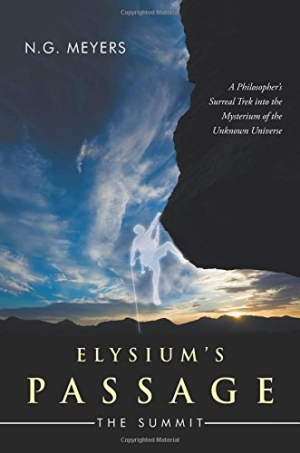Elysium's Passage
The Summit
This first book in a series raises questions that have echoed throughout the ages but whose answers remain elusive.
Elysium’s Passage: The Summit by N. G. Meyers follows a philosophy lecturer’s physically challenging and mind-bending climb up a mountain in search of wisdom.
As the main character, James, struggles to break free from his work rut and his confusion about forging authentic connections with women, he literally and figuratively tumbles off the edge into a chasm. His spirit separates from his mangled body, which is recuperating in a London hospital. He spends time in a spiritual “paradise,” searching for greater understanding, meaning, and happiness.
In a situation that moves like a “crazy dream,” James is called to leave the “Lowlands” and seek higher grounds, where he can experience deeper awareness. Two mountain guides, Mo and Eli, mysteriously appear; they offer food and lodging while raising critical points about self-discovery and the importance of leaving mistakes in the past.
Written in a confessional style, the book focuses on the James’s world weariness, left over from his days spent marking term papers and dealing with “incompetent” university administrators engaged in power struggles.
James is an often unlikable character, if he is also aware of his own shortcomings. He knows that his objectification of women makes them bristle but remains befuddled about his lack of meaningful relationships. Still, it is taxing work to push through the narrative’s constant references to women’s physical appearances and James’s egotistical assessments of his personal and professional prowess.
Educational footnotes and appendices about famous philosophers ground this summit-in-the-clouds tale, packed with interesting information about Carl Jung, Friedrich Nietzsche, Albert Einstein, Thomas Mann, and others. Terms such as “solipsistic” are also defined, providing a useful foundation for the book’s ongoing inquiries into, and comparisons of, physical versus spiritual lives.
The epilogue reveals that this first of five books is a “long introduction” to an “ongoing story” without a clear ending. At the conclusion of this book, enlightenment remains elusive. In its effort to grapple with fundamental questions about the meaning of life, it raises questions that have echoed through the ages, including about where we come from, where we are going, who we are—and whether we are truly able to find contentment.
In a fitting allusion to Sisyphus pushing his boulder, James struggles to the end to find answers. During his surreal free-fall into a new level of consciousness, he discovers that fear of failure drives his swagger. With the promise of a new woman on the horizon, upcoming books may determine whether James can find greater happiness when his spirit is reunited with his body.
Reviewed by
Andrea Hammer
Disclosure: This article is not an endorsement, but a review. The publisher of this book provided free copies of the book and paid a small fee to have their book reviewed by a professional reviewer. Foreword Reviews and Clarion Reviews make no guarantee that the publisher will receive a positive review. Foreword Magazine, Inc. is disclosing this in accordance with the Federal Trade Commission’s 16 CFR, Part 255.

